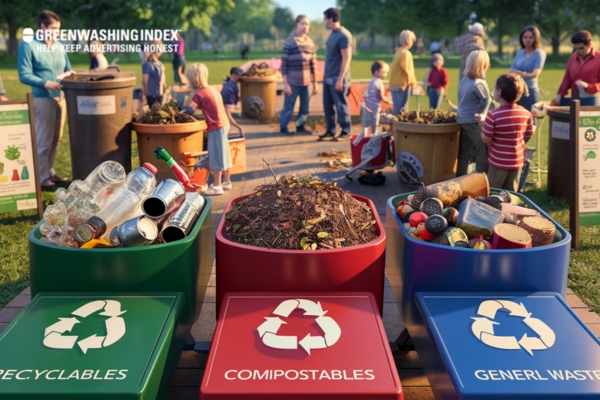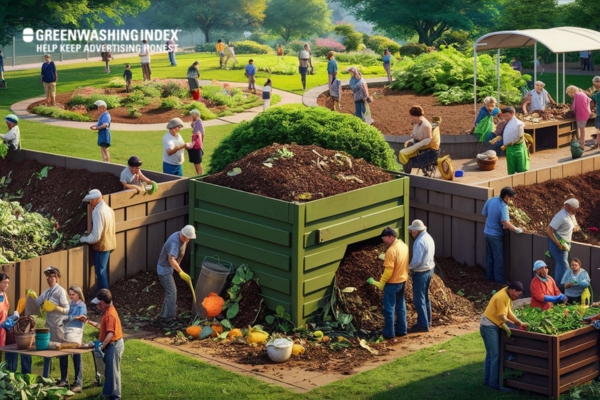

Waking up in a neighborhood where the streets are spotless, the air feels fresher, and waste bins are no longer overflowing. Such a vision might seem like a dream, but it’s a reality within reach. With the rise of the Zero Waste Community in Your Neighborhood, many are discovering the transformative power of small, sustainable changes.
Neighbors coming together, inspired by a shared goal to reduce waste and embrace a greener lifestyle. This journey not only benefits the environment but also fosters a sense of community and purpose. Ready to dive into this exciting world of sustainability? Let’s explore how you can be part of this change.
A zero waste community is focused on minimizing garbage through thoughtful production, consumption, and resource management. The core principles involve reducing waste creation, reusing items, and recycling or composting materials that can’t be used again. This approach aims for a circular economy, where products are designed to last longer and have minimal environmental impact.

By following these practices, communities work to conserve resources and reduce pollution, ensuring a healthier planet for future generations. Building such communities encourages everyone to participate actively in sustainable efforts, making a significant impact on environmental health.
Adopting a zero waste lifestyle offers numerous benefits for both individuals and communities. It promotes environmental sustainability, enhances public health, and fosters economic growth. By minimizing waste, communities can improve social cohesion and create new job opportunities while reducing pollution.
Here are some key advantages of a zero waste community:
| Benefit | Description |
|---|---|
| Conservation of Resources | Zero waste initiatives promote recycling and composting, conserving natural resources by reusing materials instead of depleting them. |
| Lower Greenhouse Gas EmissionsBy cutting down on waste, these communities help reduce emissions that contribute to climate change, creating a healthier environment. | |
| Enhanced Community Health | Reducing waste-related pollutants leads to cleaner air and water, improving the overall health of community members. |
| Economic GrowthThey create green jobs in recycling and waste management, boosting local economies while supporting sustainable living. |
By fostering a culture of sustainability, zero waste communities encourage responsible consumption, benefiting both people and the planet.
Zero waste communities are emerging as vital models for sustainable living, focusing on minimizing waste through innovative practices and community engagement. These communities aim to create a circular economy where resources are reused, recycled, and repurposed, significantly reducing the environmental impact of waste.
By fostering collaboration among residents, local businesses, and governments, zero waste initiatives can lead to meaningful change. Here are eight ways to promote a zero waste community in your neighborhood:
The specific environmental challenges faced by your community is crucial for initiating a zero waste movement. Start by evaluating local waste management practices, access to recycling facilities, and the prevalence of single-use plastics. Engage with residents to gather insights on their waste habits and preferences. This assessment will help identify priority areas for improvement, such as introducing composting programs or reducing plastic usage in local stores.

Moreover, consider the socioeconomic factors at play; areas with lower income may face additional challenges related to waste management. Tailoring your approach to address these unique needs will foster inclusive and ensure that your efforts benefit all community members.
Creating a strong network is essential for mobilizing support around zero waste initiatives. Start by organizing meetings with interested residents to discuss goals and share ideas. Use social media platforms to reach a broader audience and keep your community informed about upcoming events and initiatives.

Establishing a local group dedicated to zero waste can facilitate collaboration on projects such as community gardens or bulk-buying clubs that reduce packaging waste. Encourage participation from diverse groups within the community to ensure that various perspectives are considered, enhancing the effectiveness of your initiatives.
Education plays a pivotal role in shifting community attitudes towards waste management. Organize workshops, seminars, or informational campaigns focused on the principles of zero waste—reduce, reuse, recycle. Provide resources that explain how individuals can minimize their waste footprint through practical actions like composting at home or choosing products with less packaging.

Partner with local schools to incorporate sustainability into their curricula, teaching children about environmental stewardship from an early age. By raising awareness about the impacts of waste on the environment and public health, you can inspire more residents to adopt sustainable practices.
Effective waste separation is fundamental to achieving zero waste goals. Encourage your community to adopt comprehensive recycling and composting systems that make it easy for residents to sort their waste correctly. Work with local authorities to provide clearly labeled bins for recyclables, compostables, and general waste in public areas.

Consider implementing educational signage that explains what materials can be recycled or composted. By simplifying the process of waste separation, you can significantly increase recycling rates and reduce contamination in recycling streams.
Community composting can drastically reduce organic waste while providing nutrient-rich soil for local gardens. Set up communal compost bins where residents can deposit food scraps and yard waste. This initiative not only diverts organic materials from landfills but also fosters community interaction as neighbors work together to maintain the compost site.

Offer workshops on how to compost effectively at home, including tips on what materials are suitable for composting and how to manage compost piles. By promoting composting as a viable alternative to disposal, you contribute to soil health and reduce methane emissions from landfills.
Engaging with local government officials is crucial for creating systemic change in waste management practices. Advocate for policies that support zero waste goals, such as bans on single-use plastics or incentives for businesses that adopt sustainable practices. Collaborate with other community organizations to strengthen your voice when lobbying for these changes.

Present data showing the benefits of zero waste initiatives—such as reduced landfill costs and improved public health outcomes—to persuade decision-makers of their importance. Building relationships with policymakers can lead to long-lasting improvements in local environmental policies.
Encouraging local businesses to adopt sustainable practices is vital for creating a zero waste community. Work with shops and restaurants to implement take-back programs for packaging or offer discounts for customers who bring their own containers. Organize events that highlight businesses committed to sustainability, such as farmers’ markets featuring local produce or Eco-friendly product fairs.

By supporting businesses that prioritize sustainability, you not only help reduce overall waste but also stimulate the local economy by promoting responsible consumerism.
To maintain momentum in your zero waste initiatives, it’s essential to track progress and celebrate achievements along the way. Create metrics that measure reductions in landfill contributions or increases in recycling rates within your community. Regularly communicate these successes through newsletters or social media updates, showcasing how collective efforts are making a difference.

Celebrating milestones—such as reaching a specific recycling rate or successfully implementing new policies—can motivate residents and reinforce their commitment to the cause.
By implementing these strategies within your neighborhood, you can contribute significantly towards building a sustainable future while fostering a sense of community responsibility around environmental stewardship.
Building a zero-waste community presents various challenges that require careful planning and strong dedication. One primary obstacle is altering entrenched consumer habits, as many people are used to prioritizing convenience over sustainability.
Additionally, the lack of access to recycling or composting facilities can impede efforts to manage waste efficiently. Financial limitations might also create hurdles, as initial investments in necessary infrastructure can be costly.
Furthermore, achieving widespread participation demands ongoing education and outreach to ensure everyone understands their role in the process. Continuous engagement and support are crucial for overcoming these hurdles and fostering a sustainable community.
The journey to creating a Zero Waste Community in Your Neighborhood is both rewarding and challenging. By adopting sustainable practices, communities can significantly reduce environmental impact and enhance the quality of life for all residents. From hosting workshops to supporting local businesses, every step counts towards a more sustainable future.
While there are hurdles along the way, the collective effort of community members can overcome these challenges. Embracing the principles of zero waste not only benefits the environment but also fosters a sense of unity and purpose within neighborhoods.
If you found this article helpful, explore more insightful blogs on our site to continue your sustainability journey!
